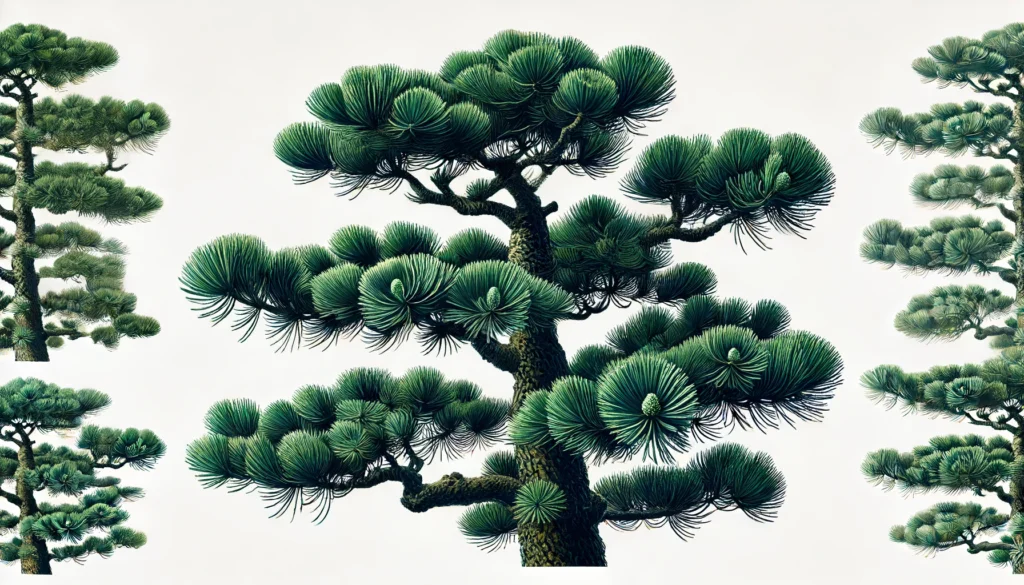

Home » Cat Plants » Does the Buddhist Pine Pose a Threat to Cats?

The Buddhist Pine (Podocarpus macrophyllus) is a toxic plant for cats. It contains toxic compounds like nagilactones and podolactones that can cause moderate to severe poisoning. These compounds primarily affect the gastrointestinal and nervous systems. The Buddhist Pine is commonly found as an ornamental tree or hedge in gardens and landscapes, particularly in warm regions.
Ingestion may cause mild gastrointestinal upset, but is generally not life-threatening.
Ingestion can result in mild symptoms like vomiting, diarrhea, or drooling. Rarely fatal but may require veterinary care.
Eating these plants can lead to more pronounced symptoms like abdominal pain, lethargy, or difficulty breathing. Veterinary intervention may be necessary.
Ingesting even small amounts can cause severe symptoms like organ damage, seizures, or cardiac failure without rapid treatment.
All parts of these plants are extremely poisonous to cats and can quickly lead to death, even with immediate veterinary care.
** Please note: Please note that toxicity level can vary based on the amount ingested and the specific cat. It's always best to keep these plants completely inaccessible to cats and seek immediate veterinary care or call the poison hotline if you suspect your cat has ingested any part of a toxic plant.
If a cat ingests any part of the Buddhist Pine, it may experience various symptoms related to gastrointestinal distress and neurological effects. Common signs include vomiting, diarrhea, abdominal pain, lethargy, incoordination, muscle tremors, seizures, respiratory distress, and abnormal heart rhythms (arrhythmia). The severity of symptoms depends on the amount consumed.
If you suspect your cat has ingested the Buddhist Pine, it is crucial to seek veterinary attention immediately. The veterinarian will likely perform a physical examination, obtain a detailed history of the incident, and potentially conduct blood tests, urinalysis, and other diagnostic procedures. Based on the findings and your cat’s symptoms, they may diagnose plant poisoning or toxicity caused by the Buddhist Pine. The veterinarian may also rule out other potential causes, such as gastrointestinal disorders, neurological conditions, or infectious diseases.

A: Yes, cats can be allergic to Buddhist Pine. Symptoms of an allergic reaction may include itching, sneezing, and skin irritation.
A: Yes, Buddhist Pine is highly toxic to cats. Ingesting any part of this plant can cause severe symptoms and can be fatal if not treated promptly.
A: Symptoms of Buddhist Pine poisoning in cats include vomiting, diarrhea, drooling, lethargy, tremors, and difficulty breathing. Immediate veterinary care is crucial if ingestion is suspected.
A: To prevent contact, ensure that Buddhist Pine is not present in your home or garden. Keep your cat indoors or monitor outdoor activities closely to avoid exposure.
A: If your cat ingests Buddhist Pine, contact your veterinarian immediately. Do not induce vomiting unless instructed by a veterinary professional. Immediate medical attention is necessary.
A: Buddhist Pine is more commonly found as an ornamental plant rather than in home gardens. However, if you do have this plant in your vicinity, it is important to ensure it is kept out of reach of cats to prevent accidental ingestion.
The Buddhist Pine (Podocarpus macrophyllus) is a species of coniferous tree native to East Asia, including China, Japan, and Korea. It has been cultivated for centuries in these regions, particularly in Buddhist temples and gardens, hence its common name. The Buddhist Pine is highly valued for its ornamental qualities, with its distinctive long, slender leaves and round seed cones. It is also known for its longevity, with some specimens living for over a thousand years.
Please note: The information shared in this post is for informational purposes only and should not be considered as veterinary medical advice.
🐾 A hilarious or heart-melting cat video
🐾 Our latest paws-on review of a cool cat toy